 On Thursday night, we explained as much as we could figure out about thousands of seemingly "missing" votes suddenly "discovered" in the incredibly close Attorney General's race in Virginia between Mark Obenshain (R) and Mark Herring (D).
On Thursday night, we explained as much as we could figure out about thousands of seemingly "missing" votes suddenly "discovered" in the incredibly close Attorney General's race in Virginia between Mark Obenshain (R) and Mark Herring (D).
Some 2.2 million votes were cast on Tuesday in the contest, yet just a few hundred (depending on what time of day one checked, as tallies were being canvassed and double-checked and corrected from around the state) separated the two on Thursday. Obenshain was said to be in the lead, according to the State Board of Elections (SBE) website, by a few more than 700 votes at night's end.
That's when several election porn geeks --- like Dave Wasserman of Cook Political Report and Ben Tribbett --- who had been combing over the results for the past several days, confirmed with elections officials an unusually low rate of absentee votes in Congressional District 8 in Fairfax County, VA. If accurate, it would have been the lowest return rate for absentees in the state, and it was considerably lower than adjacent districts in the same county. Fairfax leans heavily Democratic and, if absentee ballots were cast at the same rate there as other districts in the county, Wasserman and Tribbett concluded, there were about 3,000 votes unaccounted for in the SBE tallies. Those "missing" votes, if tallied, would be enough to give Herring the lead and, potentially, the first AG victory for a Democrat in the state in twenty years.
So what happened to those 3,000 or so absentee votes? Why were they seemingly 'missing' from the tally? By late Thursday, one of the Republican officials on the Electoral Board, Brian Schoeneman, said he was "convinced now too that there is an issue" and promised to "figure this out". Late late Thursday night, Wasserman had received an email from Fairfax County General Registrar Cameron Quinn acknowledging that VA08 totals were "in error" and that she suspected "machine totals that either didn't print tapes, or didn't show full tallies on the tapes." She said that the Electoral Board would "make figuring out what happened the first order of business in the morning" on Friday.
Unlike much of the state, which votes on 100% unverifiable touch-screen systems, Fairfax, the largest single voting jurisdiction in the state, uses paper ballot optical-scan systems made by Diebold. Those same systems --- as we described last night --- have a long history of failure, including dropping entire stacks of votes from the totals without notice to the system administrator. Could that be what happened?
Well, there were a few more twists and turns today, as the Fairfax County Electoral Board attempted to figure out what had gone wrong with their tallies, and as other counties wrapped up their canvass of the election. The Board plans to meet tomorrow to offer their official findings (their full statement below), but the only thing we know conclusively for the moment, is that one of Wasserman's tweets this afternoon was absolutely correct:
"Folks, I've been neck deep in MS Excel for 3+ days & I'm ready to make a projection," he said. "The next Virginia AG will be...Mark"...
Here is the statement offered by the Fairfax County Electoral Board late today, and we'll unpack it thereafter, as well as possible...
During that meeting, the discussion revolved around two optical scan machine tape records, one that had been included in the results, and one that had not been included in the results. After discussion with the parties and the staff, the board directed the staff to complete the canvass and to present the results of their final investigation to us once that investigation was complete. We were notified late Friday that the staff would be prepared to present their investigation results on Saturday morning.
The board will meet again with the canvass staff and observers to hear the results of their investigation at 10 a.m. on Saturday, Nov. 9, in the Conference Center of the Fairfax County Government Center. This meeting is open to the public.
Our provisional ballot meeting will begin at 2 p.m. We anticipate concluding the investigation of the 8th District issue and the provisional ballot meeting on Saturday, Nov. 9 and the overall canvass on Sunday, Nov. 10."
Here's how Antonio Olivo and Ben Pershing of Washington Post explain the problem that was discovered today on the op-scan machine or machines in question (NOTE: Some of these numbers are in dispute, which we'll get to next)...
The machine, known as an optical scanner, recorded 723 votes on election night before it broke down, elections officials said. Its memory card was then placed inside another, working machine, which recorded a total of 2,688 votes.
But that tally was not included in the statement of election results delivered by the individual voting center to the county board of elections. Instead, officials received the statement that reported the 723 votes from the broken machine.
The county’s board of elections believes that the larger total includes the original 723 votes, which could mean adding an extra 1,951 to the total outcome, said Seth T. Stark, chairman of the three-member electoral board.
So, an op-scan systems is said to have broken down on Election Night while officials were tallying absentee ballots. When that happened, after 723 ballots had been tallied on it, they took the memory card which tracks results out of the broken machine, put it into another, and finished scanning the rest of the ballots. At least as its been explained to date. But, as seems to have been the case, somehow, the 723 votes scanned on the first machine were added to the county's totals, rather than the larger number scanned thereafter.
It's unclear at the moment what went wrong on the first machine. It was also unclear, as of this afternoon, if WaPo's larger number --- the extra 1,951 --- accounts for all of the "missing" votes.
Wasserman was skeptical. In a series of tweets he explained: "Here's why: sources w/ knowledge of absentee file from 11/5 AM show 7,124 *cast* absentees in #VA08. That means at least 2,956 are missing. ... And, that was Tuesday AM, BEFORE the deadline to file mail-in votes. So there are likely more than 7,124, and more than 3k uncounted."
In fact, there were about 3,000 uncounted votes, as Wasserman surmised. Here are the rescanned numbers that Tribbett said he was later able to confirm: "Total Fairfax absentee for 8th CD is now Herring 5137 to Obenshain 2039." He added that the result was the Democratic candidate Herring "picks up 1,130 votes."
Presuming Tribbett's numbers are correct --- they will likely be confirmed by the Board on Saturday --- that would be good news for Herring, putting him up over Obenshain by about 400 or 500 votes...except for the other twist that also occurred today, in a completely different --- heavily Republican-leaning --- county.
Back to Olivo and Pershing at Washington Post for that...
We don't yet know any more about what the "human error or technical problems" were in Bedford, but between the new totals there, the new totals in Fairfax, and a few smaller adjustments in several other counties throughout the day, Wasserman's publicly crowdsourced spreadsheet on all of these errors, now projects Obenshain again in the lead by 130 votes out of more than 2.2 million cast.
In another series of tweets, Wasserman spelled out the "good news/bad news" outcome today for the Democratic candidate: "Good news for Herring (D): there were indeed 3,008 uncounted votes. Bad: he only won 68.8% of them, not enough to overtake Obenshain's lead," with the Bedford pickups added for the Republican, he said. "However, if yet-to-be-counted provisionals align w/ '09's, that alone would net Herring (D) 122 votes. This thing could be single digits."
Voters forced to cast a provisional ballot on Tuesday, for lack of proper ID or other reasons, such as voting at the wrong precinct, had until Friday to bring a copy of their ID to their local electoral board. Determinations on which provisional ballots will be added to the totals, as noted in the Electoral Board's statement, will happen on Saturday. Legal challenges and a statewide "recount" is likely to follow, no matter who comes out ahead after the canvass.
"At this [point], any slight canvass adjustment could change the lead," Wasserman tweeted late today, before adding, "It's anyone's race --- would say 'send in the lawyers,' but they've arrived."


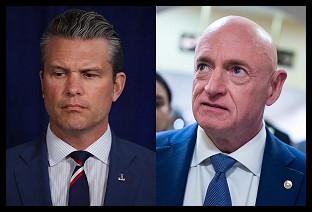 Court Blocks Hegseth Censure of Sen. Mark Kelly
Court Blocks Hegseth Censure of Sen. Mark Kelly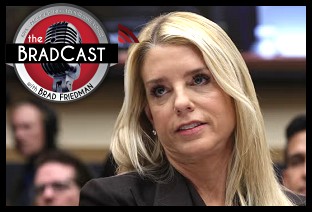 Harpy Tantrums, Legal Losses, Election Fails, Retreating ICE and Other Hopeful Signs: 'BradCast' 2/12/26
Harpy Tantrums, Legal Losses, Election Fails, Retreating ICE and Other Hopeful Signs: 'BradCast' 2/12/26 'Green News Report' 2/12/26
'Green News Report' 2/12/26
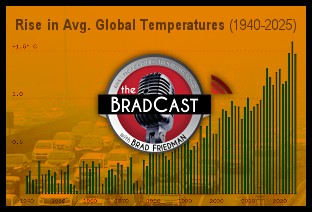 'Let Kids with Asthma Suffer': Trump to Reverse EPA's Landmark 'Endangerment Finding': 'BradCast' 2/11/26
'Let Kids with Asthma Suffer': Trump to Reverse EPA's Landmark 'Endangerment Finding': 'BradCast' 2/11/26 Trump's Presidency Now About Little More Than Racism, Corruption, Culture War Nonsense: 'BradCast' 2/10/26
Trump's Presidency Now About Little More Than Racism, Corruption, Culture War Nonsense: 'BradCast' 2/10/26 'Green News Report' 2/10/26
'Green News Report' 2/10/26 About Trump's FBI Raid of the Fulton County, GA Elections Warehouse: 'BradCast' 2/9/26
About Trump's FBI Raid of the Fulton County, GA Elections Warehouse: 'BradCast' 2/9/26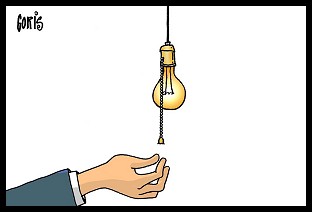 Sunday 'Dead in Darkness' Toons
Sunday 'Dead in Darkness' Toons 'New START' Treaty Allowed to End Amid New World Disorder: 'BradCast' 2/5/26
'New START' Treaty Allowed to End Amid New World Disorder: 'BradCast' 2/5/26 'Green News Report' 2/5/26
'Green News Report' 2/5/26 Trump Turns 'War on Terror' Tools Against Domestic Political Foes: 'BradCast' 2/4/26
Trump Turns 'War on Terror' Tools Against Domestic Political Foes: 'BradCast' 2/4/26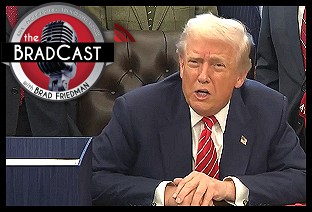 Losing Legally and Politically, Trump Threatens to 'Nationalize' Elections: 'BradCast' 2/3/26
Losing Legally and Politically, Trump Threatens to 'Nationalize' Elections: 'BradCast' 2/3/26 'Green News Report' 2/3/26
'Green News Report' 2/3/26 Bad and Good Bunnies, and an Electoral Shock in Deep 'Red' TX: 'BradCast' 2/2/26
Bad and Good Bunnies, and an Electoral Shock in Deep 'Red' TX: 'BradCast' 2/2/26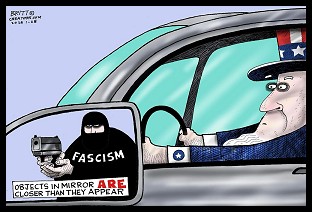 Sunday 'Mirror, Mirror' Toons
Sunday 'Mirror, Mirror' Toons 'Green News Report' 1/29/26
'Green News Report' 1/29/26 It's About Elections and the Windmills of His Mind: 'BradCast' 1/29/26
It's About Elections and the Windmills of His Mind: 'BradCast' 1/29/26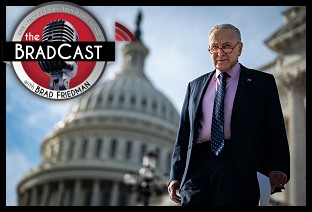 Govt Shutdown Over ICE Funding Near Certain This Weekend: 'BradCast' 1/28/26
Govt Shutdown Over ICE Funding Near Certain This Weekend: 'BradCast' 1/28/26 Trump Blinks, Bovino Out, MN Op Falters, Persists as Midterms Loom: 'BradCast' 1/27
Trump Blinks, Bovino Out, MN Op Falters, Persists as Midterms Loom: 'BradCast' 1/27  The ICE Murder of ICU Nurse Alex Pretti and the Heroes of Mpls: 'BradCast' 1/26/26
The ICE Murder of ICU Nurse Alex Pretti and the Heroes of Mpls: 'BradCast' 1/26/26  The BRAD BLOG: 22 Years and Still Counting
The BRAD BLOG: 22 Years and Still Counting Mr. Smith Testifies (Publicly) in Washington: 'BradCast' 1/22/26
Mr. Smith Testifies (Publicly) in Washington: 'BradCast' 1/22/26 World Turning Against Self-Destructing U.S. Under Trump: 'BradCast' 1/21/26
World Turning Against Self-Destructing U.S. Under Trump: 'BradCast' 1/21/26 Trump Waste, Fraud, Abuse on Voting, at DOJ, by DOGE: 'BradCast' 1/20/26
Trump Waste, Fraud, Abuse on Voting, at DOJ, by DOGE: 'BradCast' 1/20/26
 VA GOP VOTER REG FRAUDSTER OFF HOOK
VA GOP VOTER REG FRAUDSTER OFF HOOK Criminal GOP Voter Registration Fraud Probe Expanding in VA
Criminal GOP Voter Registration Fraud Probe Expanding in VA DOJ PROBE SOUGHT AFTER VA ARREST
DOJ PROBE SOUGHT AFTER VA ARREST Arrest in VA: GOP Voter Reg Scandal Widens
Arrest in VA: GOP Voter Reg Scandal Widens ALL TOGETHER: ROVE, SPROUL, KOCHS, RNC
ALL TOGETHER: ROVE, SPROUL, KOCHS, RNC LATimes: RNC's 'Fired' Sproul Working for Repubs in 'as Many as 30 States'
LATimes: RNC's 'Fired' Sproul Working for Repubs in 'as Many as 30 States' 'Fired' Sproul Group 'Cloned', Still Working for Republicans in At Least 10 States
'Fired' Sproul Group 'Cloned', Still Working for Republicans in At Least 10 States FINALLY: FOX ON GOP REG FRAUD SCANDAL
FINALLY: FOX ON GOP REG FRAUD SCANDAL COLORADO FOLLOWS FLORIDA WITH GOP CRIMINAL INVESTIGATION
COLORADO FOLLOWS FLORIDA WITH GOP CRIMINAL INVESTIGATION CRIMINAL PROBE LAUNCHED INTO GOP VOTER REGISTRATION FRAUD SCANDAL IN FL
CRIMINAL PROBE LAUNCHED INTO GOP VOTER REGISTRATION FRAUD SCANDAL IN FL Brad Breaks PA Photo ID & GOP Registration Fraud Scandal News on Hartmann TV
Brad Breaks PA Photo ID & GOP Registration Fraud Scandal News on Hartmann TV  CAUGHT ON TAPE: COORDINATED NATIONWIDE GOP VOTER REG SCAM
CAUGHT ON TAPE: COORDINATED NATIONWIDE GOP VOTER REG SCAM CRIMINAL ELECTION FRAUD COMPLAINT FILED AGAINST GOP 'FRAUD' FIRM
CRIMINAL ELECTION FRAUD COMPLAINT FILED AGAINST GOP 'FRAUD' FIRM RICK SCOTT GETS ROLLED IN GOP REGISTRATION FRAUD SCANDAL
RICK SCOTT GETS ROLLED IN GOP REGISTRATION FRAUD SCANDAL VIDEO: Brad Breaks GOP Reg Fraud Scandal on Hartmann TV
VIDEO: Brad Breaks GOP Reg Fraud Scandal on Hartmann TV RNC FIRES NATIONAL VOTER REGISTRATION FIRM FOR FRAUD
RNC FIRES NATIONAL VOTER REGISTRATION FIRM FOR FRAUD EXCLUSIVE: Intvw w/ FL Official Who First Discovered GOP Reg Fraud
EXCLUSIVE: Intvw w/ FL Official Who First Discovered GOP Reg Fraud GOP REGISTRATION FRAUD FOUND IN FL
GOP REGISTRATION FRAUD FOUND IN FL

































